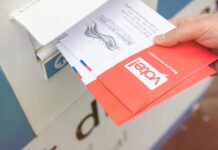Democrats have been attempting to use the courts to change election laws in swing states, including Minnesota. So far, these efforts have been successful.
The Democratic lawsuits, led by attorney Marc Elias from the law firm Perkins Coie, have sought to turn absentee voting rules into mail-in voting rules. Specifically, these lawsuits seek to allow third-party gathering of ballots (ballot harvesting), end the requirement that absentee ballots have a witness (who is a notary public or a registered voter), and allow ballots to come in well after Election Day.
Elias and Perkins Coie became infamous during the Russiagate affair, because Elias and his firm were hired by the Democratic National Committee and the Hillary Clinton campaign in 2016 to attempt to create a connection between then-candidate Donald Trump and Russia. To do so, Elias hired Fusion GPS, an “opposition research” firm, which hired a former British spook, Christopher Steele, who used anonymous Russian sources via a British national with ties to Russia to create the so-called Trump-Russia “dossier”— which alleged Trump was a Russian asset and was used by the Obama administration FBI to spy on the Trump campaign.
Elias’ lawsuits have been successful in states where Democrats control the governor’s mansion and the courts. Already, Michigan and Pennsylvania courts — controlled by Democrats — have sided with the Democratic push to ignore the existing election laws. As things stand today (before an appeal), ballots in both states will be counted well after Election Day. Critics allege that this amounts to Democratic attempts to steal the election — if former Vice President Joe Biden looks like he’s losing on Election Day, Democratic operatives can work to manufacture mail-in votes to push Biden over the edge in a tight race.
Minnesota was the next domino to fall. In an agreement between the Democratic lawyers, Democratic Secretary of State Steve Simon, and a state judge, Minnesota is now set to count ballots received by mail eight days after the election. Not only that, ballots that are not postmarked as having been sent on Election Day (have no visible postmark) will still be counted.
This raises concerns from voting rights groups, who allege that there will be an incredible incentive to manufacture votes in the days following Election Day if the outcome is not favorable.
Voicing these concerns, James Carson, a GOP presidential elector for the state of Minnesota in the 2020 presidential election, and state Rep. Eric Lucero, R-Dayton, have filed a lawsuit against the so-called agreement between a judge, liberal groups, and Simon.
The complaint filed with the court names Secretary Simon as a defendant. It points out that the U.S. Constitution gives the power to write election rules to the state legislatures. Yet in this case, courts and the secretary of state of Minnesota have usurped that power.
The lawsuit also says that the “Legislature has established a bright-line deadline of 8:00 p.m. on November 3, 2020 — the Election Day Congress set by law — for mail-in ballots to arrive at polling places,” and “ballots that fail to meet this deadline are not to be counted.” The complaint fears that the court’s ditching of election rules means that “persons in Minnesota may vote for days after Election Day and have their votes counted.” Finally, the plaintiffs point out the immense uncertainty — in both the results and the integrity of the election — that this unilateral rule change creates.
The suit was filed in federal district court on Sept. 22, and seeks to stop the Secretary of State’s Office from counting ballots received after Election Day.

















